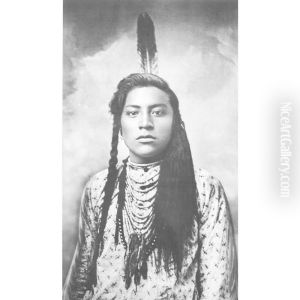Layton Alton Huffman Paintings
Layton Alton Huffman was an American photographer known for his documentation of the American West and, in particular, the everyday life and landscapes of Montana in the late 19th and early 20th centuries. Born on October 31, 1854, in Waukegan, Illinois, Huffman developed an interest in photography at a young age, which would eventually lead him to become one of the most significant visual historians of the Western frontier.
Huffman moved to Montana in 1879, where he established his first photography studio in Miles City. This period was a transformative time in American history, with the West still considered a wild and untamed region. Huffman's photographs captured the essence of the era, including images of cowboys, Native Americans, settlers, military personnel, and the changing landscape as the railroads pushed further westward.
His work is notable for its ethnographic significance as well. Huffman photographed members of the Crow, Cheyenne, and Sioux tribes, among others, providing valuable historical records of these cultures. His portraits are particularly revered for their composition and the dignity with which he portrayed his subjects.
Moreover, Huffman's landscape photographs serve as an important record of the early Western environment. They depict a land largely untouched by the technological advances that would soon transform it, offering a glimpse into the vast plains, rolling hills, and daily life in the small, burgeoning towns of Montana.
Huffman's dedication to his craft led him to develop a deep understanding of the rugged conditions of the West, which often required him to travel extensively, sometimes under harsh circumstances, to capture the images that he felt compelled to share with the world. His photographs were not only works of art but also invaluable documents of a time and place that were rapidly changing.
Layton Alton Huffman continued to work until his death on January 31, 1931, in Miles City, Montana. His legacy endures through his extensive body of work, which provides a vivid pictorial history of the American West. Huffman's photographs are held in various collections and continue to be appreciated for their artistic merit and historical importance.
